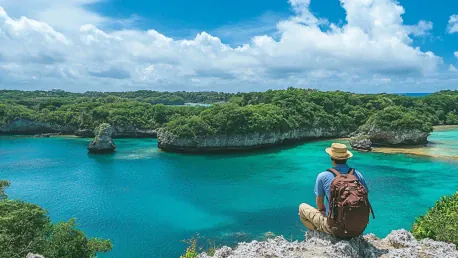Northeastern Japan’s eco-tourism landscape is set to be transformed with the introduction of the Sanpoku Bio-Regional Park in Murakami City, Niigata Prefecture. Scheduled to open in May 2025, this park aims to preserve the region’s natural beauty and historical fishing traditions while promoting sustainable tourism. Here, we explore how the Sanpoku Revitalization Council plans to achieve these ambitious goals.
Preservation of Natural Beauty and Cultural Heritage
Connecting Communities with Nature
The Sanpoku Bio-Regional Park’s primary objective is to preserve the natural beauty of the Sanpoku region and its historical fishing traditions. By fostering a deeper connection between local communities and their environment, the park emphasizes the integral relationship between the natural landscape and traditional practices. Visitors will have the opportunity to explore these connections through guided tours and educational programs designed to highlight the environmental and cultural significance of the region.
Additionally, the park aims to engage local residents in these preservation efforts, encouraging them to take part in maintaining and promoting their cultural heritage. This community-focused approach ensures that the benefits of eco-tourism extend beyond economic gains and help reinforce a sense of pride and stewardship among the local population. By connecting communities with their natural surroundings, the park hopes to inspire a collective effort toward sustainable living and environmental conservation.
Reviving Historical Practices
One of the significant efforts made by the Sanpoku Bio-Regional Park is to revive and showcase the region’s historic fishing traditions. This initiative not only aims to conserve these practices but also to educate visitors on the importance of maintaining cultural heritage in harmony with the environment. Through interactive exhibits, workshops, and demonstrations by experienced fishermen, tourists can learn about the traditional methods that have sustained the local communities for centuries.
The park will also incorporate these historical practices into its broader eco-tourism experiences, creating a unique and immersive cultural journey for visitors. This approach not only helps preserve the skills and knowledge of the past but also provides a platform for sharing these traditions with a global audience. By doing so, the Sanpoku Bio-Regional Park ensures that the region’s cultural heritage remains a vibrant and living part of the community, contributing to the overall sustainability of both the environment and the local way of life.
Eco-Tourism Experiences
Blue Tourism: Coastal Exploration
The park features the Sasagawa Nagare coastline, an 11-kilometer stretch recognized as a National Place of Scenic Beauty and Natural Monument. Visitors are invited to engage in coastal hikes, marine biodiversity tours, and experience the charm of traditional seaside villages, all while connecting with Japan’s maritime culture. The dramatic rock formations, sea caves, and sculpted cliffs that define this coastline offer a stunning backdrop for these activities, making it a must-see destination for nature enthusiasts and adventure seekers alike.
Moreover, the Sasagawa Nagare coastline provides an ideal setting for educational programs focused on marine conservation and the importance of preserving these unique coastal ecosystems. Through collaborations with marine biologists and environmental organizations, the park aims to raise awareness about the challenges facing our oceans and inspire proactive efforts to protect marine life. By blending recreational activities with educational experiences, the park ensures that visitors leave with a deeper appreciation for the natural world and a commitment to its preservation.
Green Tourism: Relishing Natural Springs
Natural springs like Kichijou Shimizu and Karei-zan Shimizu form an essential part of the park’s green tourism offerings. Known for their pure and mineral-rich waters, these springs are famous for their health benefits. Activities designed around these springs include serene forest trails, cultural tea ceremonies, and traditional spring-water farming practices, all of which provide a holistic approach to wellness and relaxation. The tranquil setting of the natural springs allows visitors to unwind and connect with nature in a meaningful way.
In addition to their therapeutic properties, these natural springs hold cultural significance and play a vital role in the region’s history and traditions. The park aims to highlight this connection by offering guided tours and informative sessions on the historical uses of spring water and its importance to local communities. By immersing visitors in these experiences, the Sanpoku Bio-Regional Park not only promotes physical well-being but also fosters an understanding of the cultural and environmental importance of preserving these natural resources.
Cultural Immersion through Forest Tourism
Understanding Kodo Fishing
A highlight of the park’s cultural offerings is the practice of “Kodo fishing” in the Okawa and Gatsugi Rivers. This traditional method, persisting for over 350 years, provides visitors with an authentic glimpse into historical fishing techniques through live demonstrations and interactions with master fishermen. The Kodo fishing practice is not only a fascinating cultural experience but also a testament to the ingenuity and sustainability of traditional methods that have supported local communities for generations.
Visitors will have the chance to participate in hands-on activities, such as setting fishing traps and learning how to identify different species of fish native to the region. These immersive experiences allow tourists to gain a deeper understanding of the delicate balance between human activity and environmental conservation. By promoting the value of traditional practices, the Sanpoku Bio-Regional Park ensures that these age-old techniques continue to thrive and contribute to the region’s cultural heritage.
Experiencing Local Seafood
The Kodo fishing experience is further enriched by opportunities to taste freshly caught local seafood. This immersive approach enhances visitors’ appreciation of the region’s cultural practices and culinary traditions. Local chefs and fishermen collaborate to offer unique dining experiences that showcase the flavors and techniques that have been passed down through generations. These meals not only highlight the quality and freshness of the local seafood but also provide a deeper connection to the region’s history and way of life.
The park will also host cooking workshops and culinary tours, where visitors can learn to prepare traditional dishes using locally sourced ingredients. These activities support the local economy by promoting the region’s culinary heritage and creating new opportunities for sustainable food tourism. By offering a comprehensive cultural and culinary experience, the Sanpoku Bio-Regional Park hopes to leave a lasting impression on visitors, encouraging them to support and preserve the unique traditions of northeastern Japan.
Impact on Global Travel Industry
Attracting International Visitors
Sanpoku Bio-Regional Park is poised to attract eco-conscious travelers from around the world, offering immersive experiences beyond the usual destinations. This shift not only promotes the region but also helps diversify Japan’s tourism landscape. By providing an alternative to the crowded urban centers, the park aims to showcase the untapped potential of rural Japan and its rich cultural and natural heritage.
The park’s innovative approach to eco-tourism is designed to cater to a growing market of travelers who seek meaningful and responsible travel experiences. By emphasizing sustainability and cultural immersion, the Sanpoku Bio-Regional Park sets itself apart from conventional tourist attractions, making it a must-visit destination for those looking to explore the hidden gems of Japan. This influx of international visitors is expected to boost the local economy, create new job opportunities, and foster cross-cultural exchanges that benefit both tourists and residents alike.
Sustainability and Rural Rejuvenation
Northeastern Japan’s eco-tourism landscape is set to be significantly enhanced with the emergence of the Sanpoku Bio-Regional Park in Murakami City, located in Niigata Prefecture. Set to open in May 2025, this innovative park strives to maintain the natural charm of the area while celebrating its historical fishing traditions. The initiative also firmly promotes sustainable tourism practices. The Sanpoku Revitalization Council spearheads this project with a focus on achieving these high-reaching objectives.
The council’s approach includes various strategies to integrate ecological balance with cultural preservation. They plan to offer educational programs about the local ecosystem and fishing heritage, alongside activities that support eco-friendly tourism. Efforts to involve the local community in conservation practices will help foster a deeper connection to the environment. By doing so, the park not only aims to attract visitors but also to instill a sense of responsibility towards nature in its guests. This project marks a crucial step in transforming the eco-tourism sector in Northeastern Japan, presenting a model that harmonizes tourism with nature conservation and cultural heritage.









